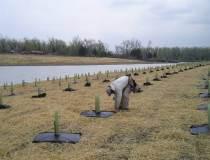
© www.osmre.gov
The Coalition of Financially Challenged Countries with Lots of Trees, known as ‘CoFCCLoT’, representing most of the world’s remaining tropical forests, is asking wealthy nations to share global responsibilities and reforest their land for the common good of stabilizing climate and protecting biodiversity.
“We are willing to play our part, but we require a level playing field in which we all commit to equal sacrifices,” a coalition spokeswoman says. “Returning forest cover in the G8 countries and the European Union back to historic coverage will benefit all of us in the long-term.”
Seventy-five per cent of Europe was once forested. Now it is 45 per cent. Some countries such as Ireland saw forest cover reduced to near zero. Most forest cover in the developed world is now often planted with stands of alien trees, turning them into deserts for biodiversity. Remaining natural forests are often highly fragmented and have few native species.
“For all the forests we in Indonesia, Brazil or Central Africa do not cut down, G8 countries should reforest a similarly-sized area,” says the CoFCCLoT spokeswoman. “Too many agricultural areas in Europe and the USA are only kept in business because of tariffs and subsidies.”
CoFCCLoT members also ask why they are criticized for developing oil palm plantations, even though these produce much more biofuel and oil per unit area than temperate crops such as maize — and thus require much less land to satisfy global demands. With the world’s population expected to reach 10.5 billion by 2050, it is crucial that food and fuel are produced efficiently, and where most population growth is expected.
CoFCCLoT points out that nature in wealthy nations needs urgent attention. “Large areas are degraded. Soils are compacted, soil faunas depleted, and their hydrology disrupted and contaminated.”
The coalition says that if wealthy nations restore their forests, they can help slow climate change by absorbing atmospheric carbon and provide people with clean water and healthy soils. They also highlight the benefits for species diversity and environmental services.
CoFCCLoT notes the opportunities to reintroduce bears, lynx, wolves, beavers and other threatened animals that have been severely reduced or driven to extinction in the Northern Hemisphere by rampant exploitation of natural forests in much of the industrialized world.
It says too that in the longer-term, ongoing climate change and reforestation might permit tropical megafauna to thrive in temperate countries. Lions could be reintroduced to Greece, they suggest, and gorillas might thrive in Spain. Both countries face economic challenges that could be reduced by the revenues from ecotourism.
New markets for local handicrafts and also cultural entertainments are anticipated in G8 countries. These developments would reduce agricultural pressure on the forests.
CoFCCLoT expects that their member countries will provide funds for local capacity building, awareness raising, dealing with human wildlife conflicts and law enforcement in the USA, Japan and Europe. “The limited capacity in many of these regions is a concern. But we are willing to share our skills and experiences” said the spokeswoman.
The coalition acknowledges that their demands will meet some resistance. People might be scared to live near large forests with wild animals and may be resentful of not being allowed access to forest resources. “But people will get used to it,” explains the spokeswoman.
“It is time to share these global responsibilities,” she adds. “The G8 cannot have their cake and eat it too”.
–
Confused? Wait for Installment Two in a week or so…

